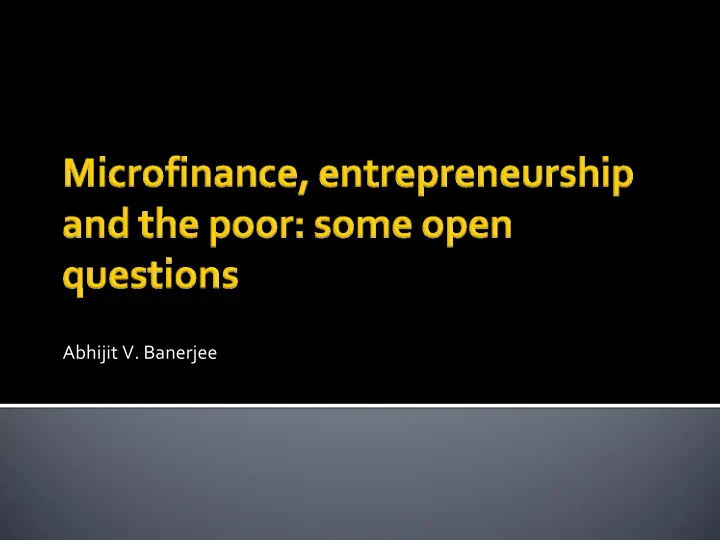

Abhijit V. Banerjee
� Microfinance has proved to be an effective way into the lives of the poor. � Large numbers of the poor clearly want microfinance � Moreover MFIs have created a large cadre of non ‐ poor who have a stake in the economic well ‐ being of the poor.
• That it has a positive impact • More business start ‐ ups • More business assets purchased • Less wasteful expenditure • Less hunger • Less job losses etc. • Higher income. • Etc.
• No clear impact on the average person’s consumption • No clear impact on measures of empowerment. • They might take time: – In the case of consumption because theory predicts that the short ‐ run impact may be negative when there are non ‐ convexities – Income might go down if investment takes time – And empowerment might wait till income goes up
Puzzle 1: Heterogeneity in behaviors: Why do some people take up and others do not? Hyderabad versus Guntur � People just do not want start a business: ▪ Why if average returns are high as the data seems to suggest? � May be there is a lot of heterogeneity: � They have better uses for their time: ▪ Other jobs, “homework”, demand for leisure, risk aversion (all suggesting limited potential for growth) ▪ Does that mean that these high returns fall off very quickly?
� Loan size too small: ▪ Fixed costs ▪ Or a lack of an alternative vision for the future � Lack of skills ▪ What about skill training for participants? ▪ Who should pay for the training � Why not borrow to repay loans ▪ Does everyone who has a high interest loan take up micro ‐ credit ▪ If not why not?
Lack of default: Why hasn’t there been more default? � Promises of future loans? ▪ But why not default and hold on to your capital (Bulow ‐ Rogoff)? ▪ Awareness of self control problems: need a commitment device to manage to save? � Then we should expect default among the most productive borrowers: Do we see this? � Implications what will happen if better savings products
� Shame/pride: ▪ But then why just micro ‐ credit loans? ▪ Importance of the “social” aspects of MFIs � Harassment: ▪ What is the difference with money ‐ lenders? ▪ Is it just lower transaction costs that make lower interest rates possible which legitimizes harassment? ▪ What cannot money ‐ lenders t lower transaction costs? � Lack of understanding of the possibilities for default: implications for learning and financial literacy
Why hasn’t competition been more damaging? � People understand how much they can repay ▪ But why repay if you can borrow from someone else? ▪ Others will tell on you? But why? Why not have your whole group default and move to a different group? ▪ Why do we believe that they are so good at figuring out how much to borrow given that they have all kinds of self ‐ control problems and lack financial literacy ▪ More likely some people are over ‐ borrowing and somehow finding a way to repay.
What is the role of group lending? What is the extent of enforcement of group liability? What about groups which have group responsibility without group liability? � Peer selection � Who do groups reject? Are they right people? � Peer monitoring: do people really know enough about other people’s businesses to be useful? � Public shame? Why here and not elsewhere? � Just transaction costs (including the transaction cost of arranging for money to deal with shortfalls) � Why not have one person bring the money? Is the risk of theft so large given that there is so little default? Other empathy building functions?
� What is it about women? � How do we think about gender effects in repayment? � “Women have adverse selection, men have moral hazard” ▪ Do women have greater self ‐ knowledge ? ▪ Or men are over ‐ optimistic ? ▪ Or different sample selection? � How do we think of gender effects in rates of returns?
� Flexibility: Do we need weekly repayment? Should prepayment be allowed? � Insurance, encouraging risk ‐ taking: “equity” like contracts? � For MFI clients—how do you measure output? � For slightly bigger firms, can we have VC like contracts: ▪ how sophisticated do you need to judge the performance of firms � “Graduation”: Do loan officers know their clients? � Credit scoring: Does it help or hurt? � Closely related to the previous question. � If learning about fixed investor types, then ex post competition hurts � If learning about past bad behavior is key then information is good � Self ‐ reliance: should MFI’s charge “market rates?”
� Health/life insurance: often convenient for MFIs but not necessarily liked by borrowers � Health/education communication � Channel for increasing /improving investment in health/education/infrastructure � Conduit for vouchers/government funding � Regulator � Supplier � Should we go beyond? � Mission drift? � Or self ‐ discovery
� Depends on our theory of what makes people join/repay � If people think of it primarily as just another source of credit � If people react to the ‘social” aspect of MFIs � If people think of it an opportunity to “transform” their lives � Under the two last theories the extra resources that you deliver are complements for the loan (and for subsidized loans)
� Is entrepreneurship is the way forward for the poor? � Or is it a way ‐ station, an (inefficient) way of creating jobs for themselves because the market is not doing so � At least for the large majority of the borrowers � For the long run: � is the most important contribution of microcredit to be the identification of potential large, successful business people who will employ the rest? � Or is to create a new form of people’s capitalism?
Recommend
More recommend